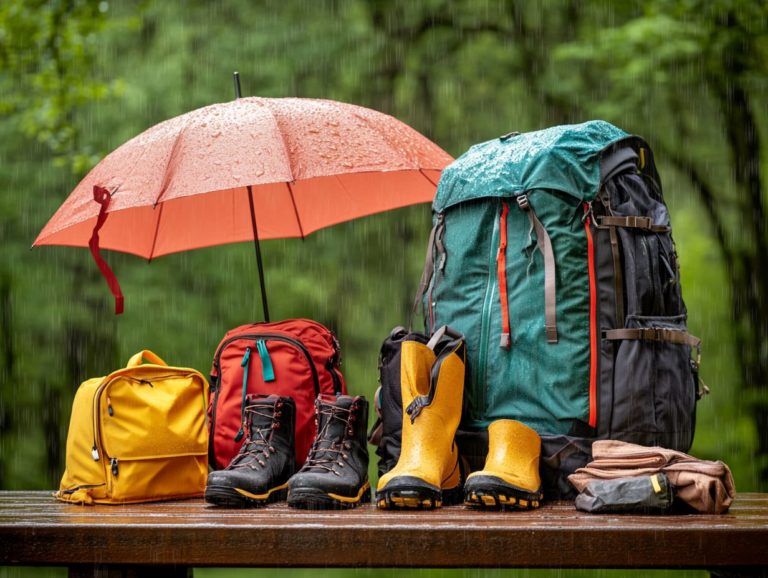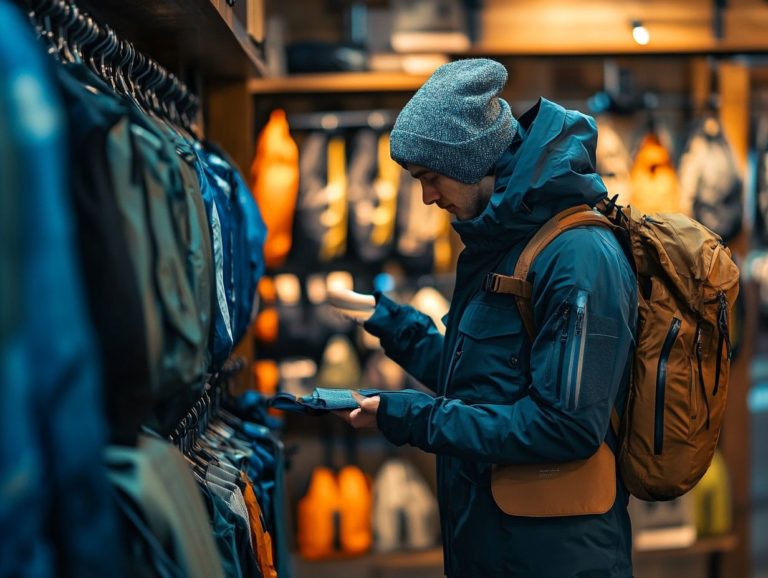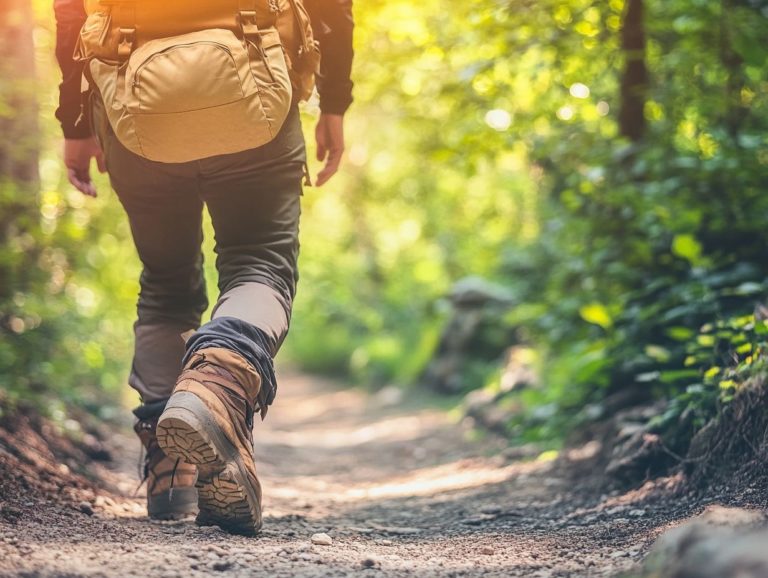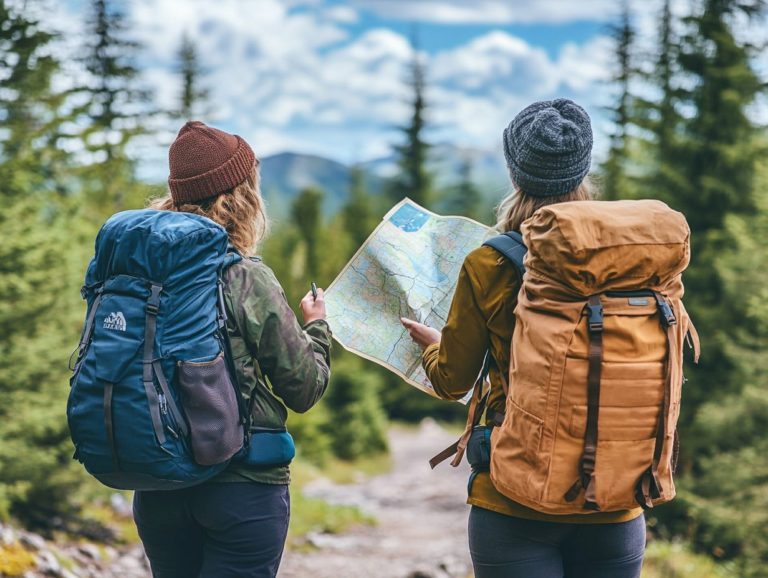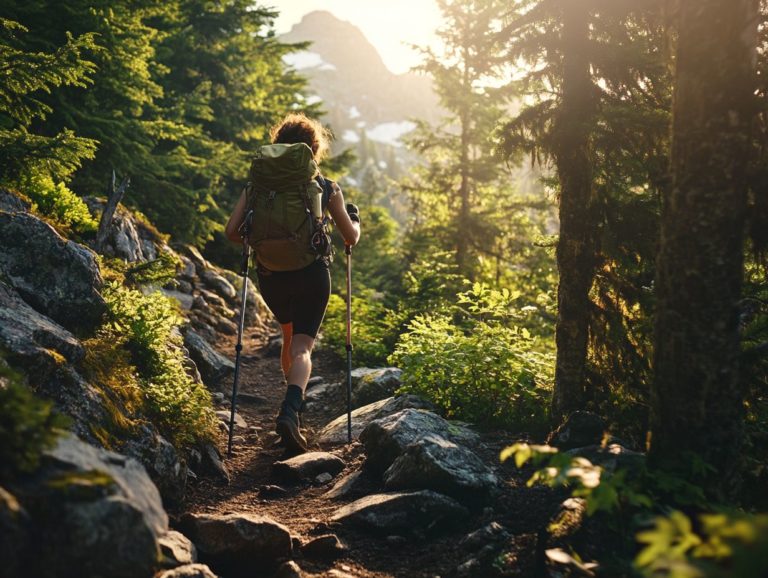Best Hiking Gear for Beginners
Embarking on your first hiking adventure can be an exhilarating yet intimidating experience. With the right gear, you can elevate your journey and navigate nature s wonders with confidence. This guide highlights essential items that every beginner should have, from reliable hiking boots to essential navigation tools. Whether you re gearing up for a day hike or a weekend escape, having the proper equipment can truly transform your experience. Get ready to explore the trails and let s delve into the must-have hiking gear that will prepare you for success on the trails!
Contents
- Key Takeaways:
- 1. Hiking Boots or Shoes
- 2. Moisture-Wicking Clothing
- 3. Backpack
- 4. Navigation Tools
- 5. Water Bottle or Hydration Pack
- 6. Sun Protection
- 7. First Aid Kit
- 8. Emergency Shelter
- 9. Headlamp or Flashlight
- 10. Multi-Tool or Pocket Knife
- 11. Insect Repellent
- 12. Trekking Poles
- 13. Snacks and Meals
- 14. Map and Compass
- 15. Personal Items (ID, Cell Phone, etc.) – Essential for Hiking
- Frequently Asked Questions
Key Takeaways:
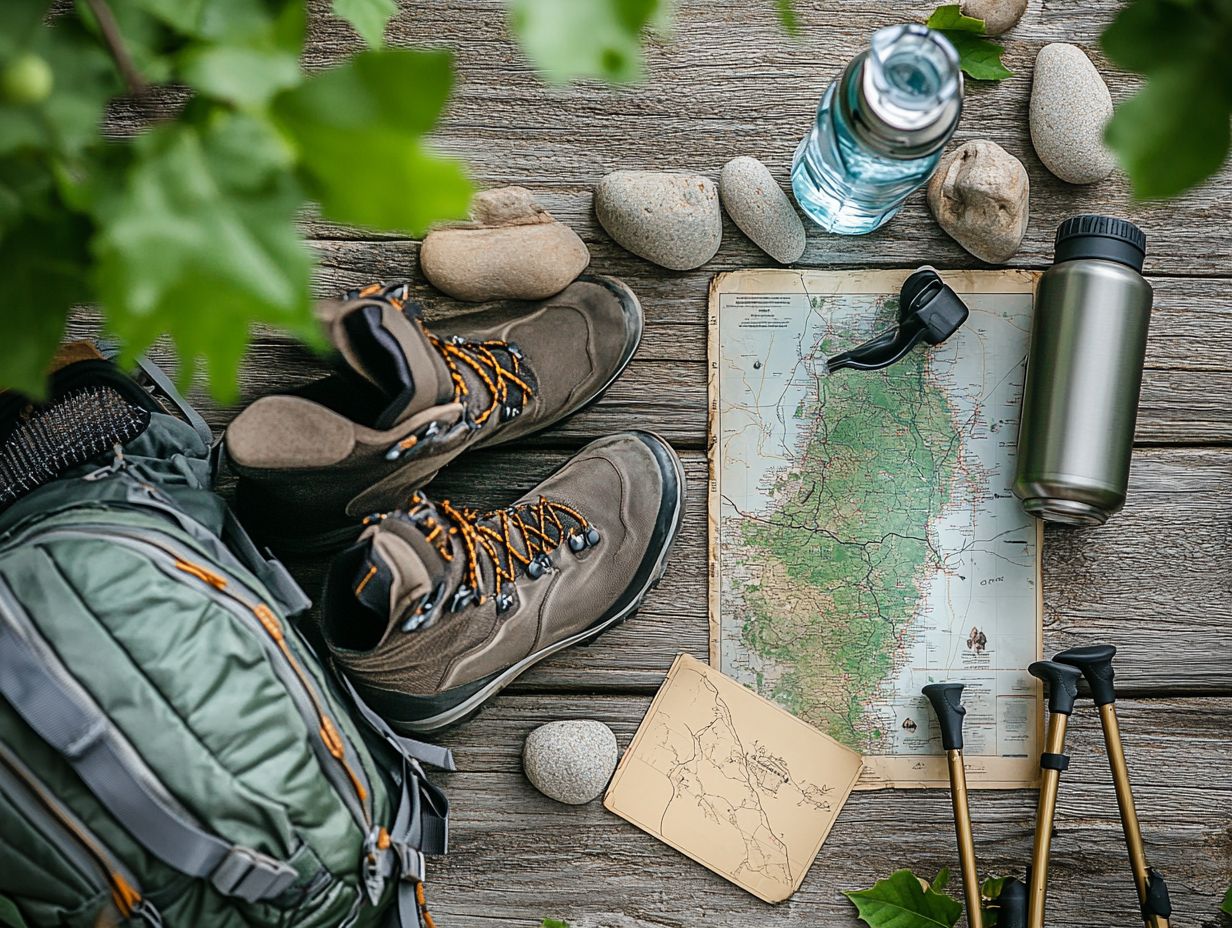
- Invest in a good pair of hiking boots or shoes that provide comfort, support, and traction to avoid injuries and blisters.
- Choose moisture-wicking clothing to keep you dry and comfortable during your hike; avoid cotton, which retains moisture and can cause chafing.
- Always bring a backpack to carry all your gear, ensuring it fits comfortably and has enough space for your essentials.
1. Hiking Boots or Shoes
Hiking boots or shoes are absolutely essential for you as a hiker, especially if you’re just starting out in rugged terrains like Southern Illinois’ Shawnee National Forest. A solid pair of hiking footwear can transform your experience, offering the support, traction, and waterproofing you need to tackle those challenging trails with confidence.
When selecting your hiking boots, consider options like the Osprey Tempest for women or the REI Trail line; these are known for their lightweight and functional designs. Additionally, be sure to check out essential hiking gear for beginners. Investing in quality gear won’t just enhance your hiking experience; it will also ensure that you’re safe and comfortable on your adventures.
The choice of the right footwear becomes even more critical as you encounter different trails and weather conditions that demand specific features in your boots. For example, Merrell boots provide excellent cushioning and grip for rocky paths, while Altra helps maintain a natural foot position. If you’re facing more extreme weather, Danner offers durable options that won t let you down.
It’s important to understand fit and support, especially for novices who might not be accustomed to long hikes. Properly fitted boots can help you avoid blisters and fatigue, allowing you to fully enjoy the journey without discomfort. For those gearing up for their next adventure, knowing about hiking gear: must-have items for all seasons is essential. Choosing wisely guarantees that each trek you embark on is both memorable and safe.
2. Moisture-Wicking Clothing
Choosing the right hiking clothing, particularly moisture-wicking materials, is essential for keeping you comfortable on your outdoor adventures, especially if you’re diving into budget hiking. Moisture-wicking fabrics work wonders by regulating your body temperature, drawing sweat away from your skin, and preventing chafing. This is especially critical for beginners navigating diverse climates, as it allows you to layer appropriately and adapt to shifting weather conditions.
When selecting your gear, consider breathable options like polyester and merino wool. These materials repel moisture and provide insulation during cooler hikes. Effective layering is your best friend; start with a moisture-wicking base layer, add an insulating mid-layer, and top it off with a waterproof outer layer. This combination creates a versatile outfit that easily adapts to various climates. For more information, check out this essential gear for a successful backpacking trip. For budget hiking, look for affordable gear that will still meet your needs.
For newcomers, affordable gear is often just a stone’s throw away at local outdoor stores or online discount outlets, making it easier to find the right fit and functional style. Remember to prioritize comfort over fashion look for items that offer a bit of stretch and room for movement, significantly enhancing your overall hiking experience.
Grab your gear and hit the trails!
3. Backpack
A reliable hiking backpack is important for hiking, especially for beginners who need to carry essentials like water, snacks, and first-aid kits.
Choosing a lightweight, functional backpack like those from Osprey ensures you have plenty of room for your hiking essentials without the added burden of unnecessary weight. To get started, consider checking out camping gear for beginners that includes features such as hydration pack compatibility and comfortable straps that will elevate your overall hiking experience.
The size of your backpack should match the length and difficulty of your hike. For a day hike, a 20-30 liter pack is generally ideal, while overnight excursions might require something larger. Weight matters too; a heavier pack can lead to fatigue and discomfort on the trail.
Organizational compartments can make all the difference, allowing you to access your gear easily and quickly when you need it.
Brands like Osprey provide a fantastic range of options, with models such as the Osprey Daylite being particularly well-suited for beginners. To pack efficiently, consider using packing cubes or dry bags to keep your gear organized and minimize the time spent digging through your backpack during your adventure. For more tips on choosing the best gear, check out the best lightweight camping gear for backpackers.
Navigation tools like maps and compasses are crucial for ensuring your safety and enhancing your hiking experience, especially if you’re a beginner exploring unfamiliar trails.
Understanding how to use these tools effectively can save you from the frustration of getting lost in remote areas, particularly in places like Southern Illinois’ Shawnee National Forest, where trails can be less clearly marked. Mastering navigation skills is vital for enjoying outdoor adventures with confidence and security.
While modern GPS devices offer convenience and real-time updates, they rely on batteries and signal strength, which can be unreliable in isolated regions. Blending these advanced technologies with traditional navigation methods like reading topographic maps or using a compass creates a more dependable strategy.
For optimal safety, practice plotting routes and familiarizing yourself with landmarks. This ensures you can navigate even if your electronic devices decide to take a break.
Ultimately, honing your navigation skills prepares you for diverse terrains and fosters a sense of independence and resilience in the great outdoors.
5. Water Bottle or Hydration Pack
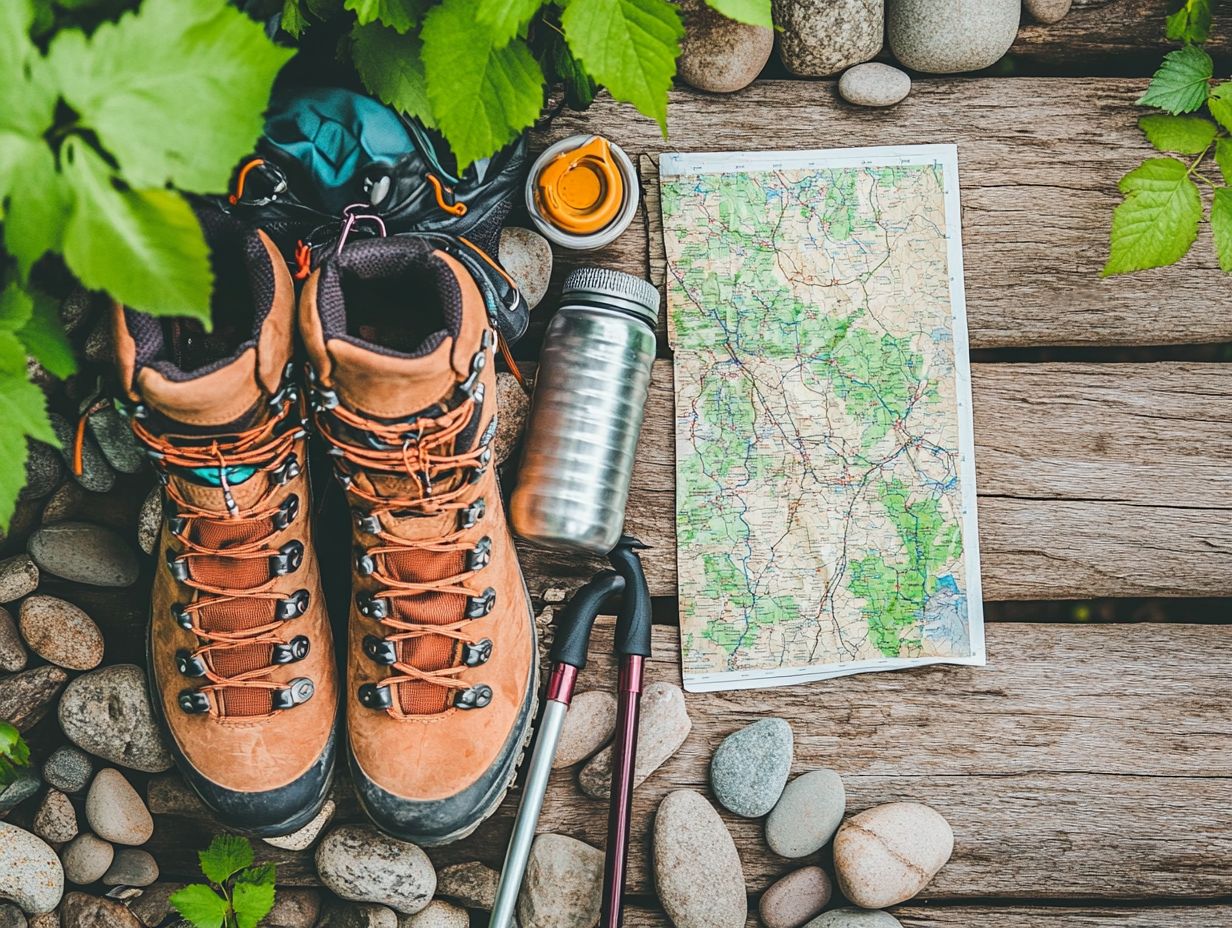
Hydration is key to a great hiking experience! A quality water bottle or hydration pack is a must-have in your gear collection, especially for beginners.
Whether you choose a lightweight, functional hydration pack or a classic water bottle, the goal is clear: ensure you have enough water to keep your energy levels up and stave off dehydration while savoring the great outdoors.
Proper hydration enhances your hiking experience and significantly boosts your safety on the trails.
When planning your hike’s duration and intensity, hydration packs can be a game-changer, offering a hands-free, convenient way to carry water. They let you take quick sips without missing a beat. For shorter, less demanding hikes, a sturdy water bottle might work just fine.
It s wise to aim for about half a liter of water per hour, although your needs may vary depending on your individual circumstances and the weather.
In hotter climates, the risk of dehydration ramps up, so adjust your water intake accordingly. Brands like CamelBak and Osprey are popular for their high-quality hydration packs that cater to all sorts of hiking experiences, while Nalgene and Hydro Flask make durable water bottles that are easy to refill and clean.
6. Sun Protection
Sun protection is essential for hikers. Spending long hours in the sun can lead to serious consequences.
Use broad-spectrum sunscreen with at least SPF 30. Reapply it every two hours, especially if you sweat or swim.
Wear UV-blocking clothing. Invest in sunglasses that provide 100% UV protection.
A wide-brimmed hat minimizes sun exposure on your face. Brands like Coppertone and Neutrogena offer reliable sunscreens.
Plus, donning protective clothing is a good idea. By combining these strategies, you can effectively fend off harmful rays while savoring every moment outdoors.
7. First Aid Kit
A stocked first-aid kit is crucial for hiking, especially for beginners. It can help in unexpected situations on trails.
Include bandages, antiseptic wipes, and pain relievers. These items boost your safety and preparedness.
A good kit should contain gauze pads, adhesive tape, tweezers, and emergency space blankets.
Pre-assembled kits suit beginners well. If you prefer, customize your kit based on your needs.
Understanding these items prepares you for injuries and fosters responsibility outdoors.
8. Emergency Shelter
Carrying an emergency shelter is vital for hiking. It protects against sudden weather changes.
For new hikers, a lightweight, compact shelter enhances safety. It helps manage unforeseen circumstances.
Options include space blankets for minimalists and bivy sacks for more protection. For longer hikes, consider a lightweight tent.
Know your hike’s duration and terrain to choose the right shelter. Practice setup techniques in safe conditions.
9. Headlamp or Flashlight
A reliable headlamp or flashlight is essential for hiking, especially in low-light conditions. Proper lighting improves your safety and makes navigating tough trails easier.
When choosing your lighting, focus on brightness (measured in lumens) and battery life. You don t want to be caught off guard in the dark!
A headlamp allows for hands-free operation. This feature is handy for setting up a tent or checking a map while keeping your focus on important tasks.
On the other hand, flashlights can provide a more powerful beam for longer distances. Brands like Black Diamond, Petzl, and Fenix offer reliable options to meet various outdoor needs.
10. Multi-Tool or Pocket Knife
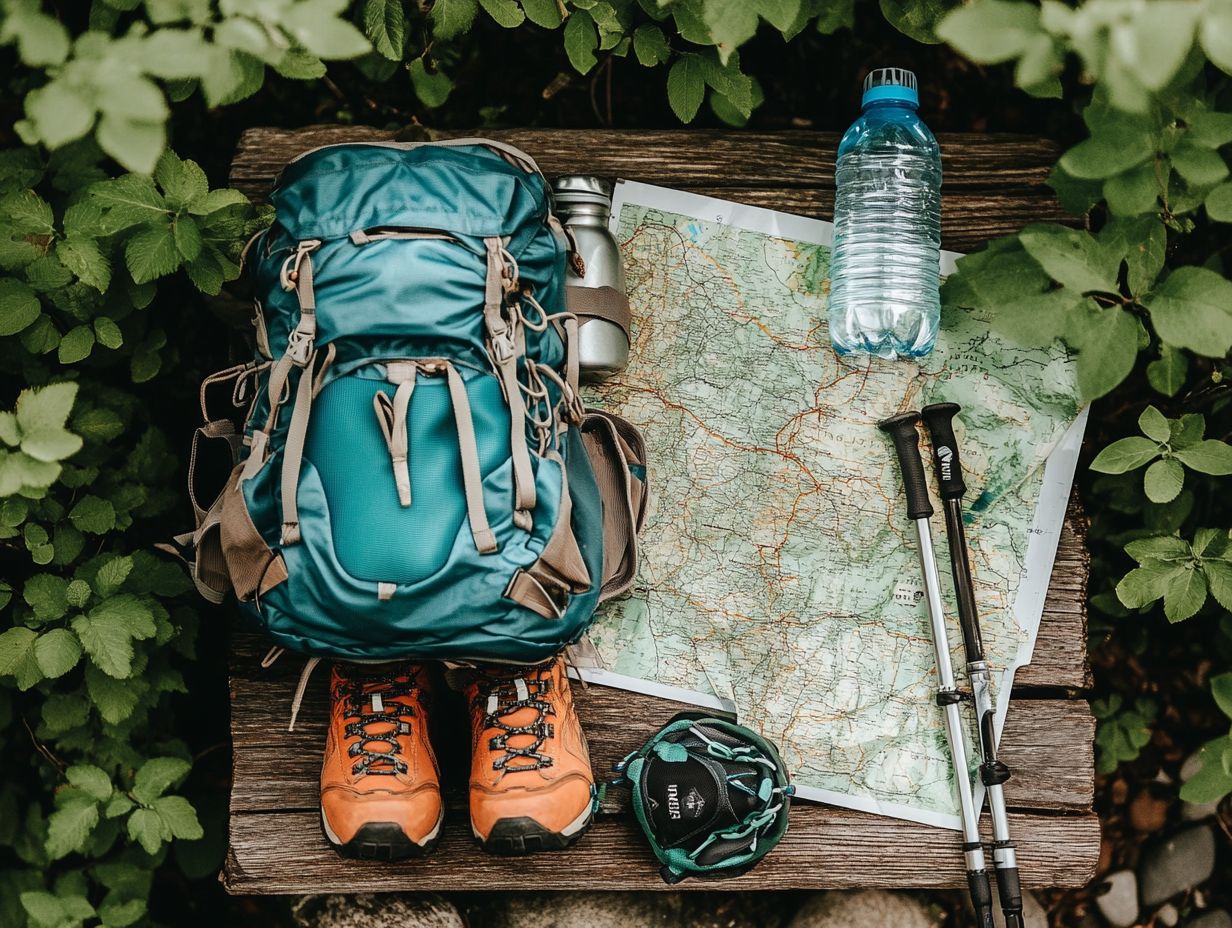
A multi-tool or pocket knife is a must-have for hiking. It offers a versatile solution for many tasks during your adventures.
Quick access to tools like scissors, screwdrivers, and knives enhances safety and convenience on the trails. A quality multi-tool prepares you for unexpected situations, making each hike more enjoyable.
These handy tools help with simple repairs and food prep. Tasks like fixing gear, cutting rope, or preparing a meal become easier with the right equipment.
When looking for a reliable tool, consider its weight and compactness. A lightweight design eases your pack load and improves portability.
Ultimately, having these tools can boost your safety and problem-solving skills while you explore the outdoors.
11. Insect Repellent
Insect repellent is a crucial part of your hiking gear, especially if you’re new to the outdoors. An effective repellent protects against pesky mosquitoes and ticks, ensuring a more enjoyable hike.
You can choose from sprays, lotions, and natural options. Chemical sprays often provide long-lasting protection, while lotions add hydration along with defense.
If you prefer eco-friendly solutions, natural alternatives like citronella oil are available, though they may not be as effective. Choose a repellent based on your hiking environment and any skin sensitivities.
Remember to reapply as needed, especially after sweating or getting wet, to maintain your protection throughout your adventure.
12. Trekking Poles
Trekking poles are an essential addition to your hiking gear. They provide enhanced stability and support, especially if you’re a beginner navigating uneven or steep terrains.
By distributing weight and alleviating strain on your joints, trekking poles can significantly improve your safety and overall comfort during outdoor adventures.
Selecting the right pair of lightweight, functional poles can elevate your hiking experience, making it easier to tackle challenging trails.
These versatile tools deliver essential support on rocky or slippery surfaces. They also help you maintain balance while maneuvering through mud or snow.
Proper height adjustment is crucial. Ensure the poles fit your height and the terrain you re facing for optimal performance.
A comfortable grip is vital as it minimizes hand fatigue during those longer treks.
Brands like Black Diamond, Leki, and REI Co-op have established a solid reputation for offering quality trekking poles at reasonable prices, making them an excellent choice for both novice and experienced hikers.
13. Snacks and Meals
Carrying the right snacks and meals is essential for maintaining your energy levels during hikes. This is particularly important if you’re new to the great outdoors and might underestimate the physical demands of this activity.
Think of items like trail mix, energy bars, and water snacks. These are stellar choices to keep you fueled on the trail, ensuring an enjoyable hiking experience without the looming threat of fatigue.
By prioritizing nutritious options, you ll enhance your stamina and elevate your overall enjoyment of the journey.
When selecting snacks, aim for a combination of carbohydrates, proteins, and healthy fats to sustain your energy throughout the trek.
For convenience, choose lightweight and easily packable items that can brave the elements, so they remain fresh without needing refrigeration.
To enhance your outdoor experience, consider whipping up a homemade trail mix by blending nuts, dried fruits, and whole-grain cereals. This mix provides a delightful balance of nutrients and flavors.
Don t underestimate hydration; it s crucial. Incorporate water-rich snacks like citrus fruits or ensure you have enough water in your pack.
Staying hydrated plays a vital role in your overall performance on the trail, keeping you at the top of your game.
14. Map and Compass
Understanding how to use a map and compass is essential for navigating trails safely, especially for beginners who may not yet be familiar with outdoor navigation tools.
These traditional methods provide a reliable way to find your way, even in areas where GPS signals (Global Positioning System) can falter. This allows you to explore the trails with confidence and without the fear of getting lost.
Mastering these skills will significantly enhance your hiking experience, offering you a sense of direction and safety.
Familiarizing yourself with the symbols and contour lines on maps that show the shape of the land will unveil valuable information about elevation changes, natural features, and potential hazards.
When used correctly, a compass enables you to orient your map to the terrain, keeping you on the right track.
Practicing with these tools is an exciting way to boost your confidence. It s wise to start in a familiar area before venturing into the wilderness.
Engage in simple exercises, such as plotting a course or practicing sighting a bearing, to build your skills.
Remember, even seasoned adventurers carry a map and compass; don t rely solely on technology, as it can lead to unexpected challenges.
Don t wait to get lost master the map and compass today!
15. Personal Items (ID, Cell Phone, etc.) – Essential for Hiking
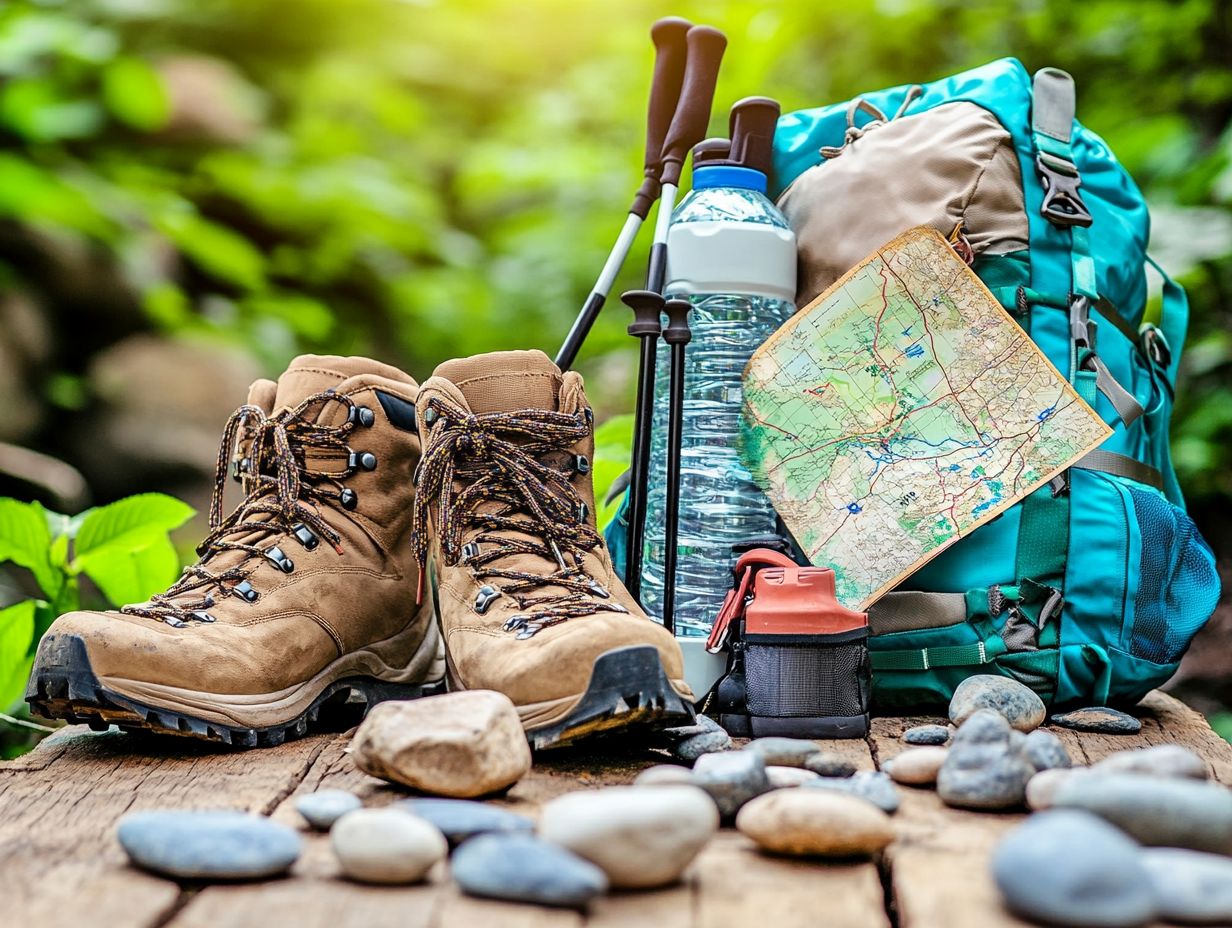
Carrying essential personal items like identification, a cell phone, and emergency contacts is crucial for ensuring your safety during any hiking trip, especially if you re a beginner tackling unfamiliar terrains. Having these items readily available can streamline communication and assistance in emergencies, making your outdoor experience not only safer but also more enjoyable.
By prioritizing these personal essentials, you effectively reduce risks while making you feel safer on the trails.
In addition to these basics, pack a detailed map and compass, particularly if your hiking route veers off the beaten path. Storing them securely in a waterproof pouch will safeguard them from the elements.
Smartphone apps are powerful tools for navigation; they provide real-time tracking and can also supply local emergency numbers, enhancing your preparedness.
Always make it a point to inform a trusted friend or family member about your hiking plans, including your expected return time. This simple step can be incredibly valuable if you find yourself needing assistance, highlighting the significance of diligent planning.
Frequently Asked Questions
What is the best hiking gear for beginners?
The best hiking gear for beginners includes comfortable hiking footwear like Altra or Merrell, a sturdy hiking backpack such as Osprey Temptest, a water bottle, appropriate clothing layers, and a hiking map or guidebook.
Why is having comfortable hiking shoes important for beginners?
Comfortable hiking shoes or hiking boots provide support and protection for your feet, reducing the risk of blisters and injuries. They also provide better traction on different types of terrain, which is crucial when navigating trails.
What should I look for in a backpack for beginner hiking?
A hiking backpack with padded straps and back support is ideal for beginner hikers. It should also have multiple compartments for organization and be the appropriate size for your needs, especially when carrying trail mix and water snacks.
Are there any essential items I should bring when hiking for the first time?
Aside from the basic gear, there are a few essential items to bring when hiking for the first time. These include a first aid kit, a whistle, sunscreen, and insect repellent.
Why is it important to bring a hiking map or guidebook for beginners?
A hiking map or guidebook can help beginners hiking stay on the right trail and prevent getting lost. It also provides information on the difficulty of the trail and any potential hazards to be aware of, reinforcing the need for hydration packs.
Do I need to spend a lot of money on hiking gear as a beginner?
No, you do not need to spend a lot of money on budget hiking gear as a beginner. It’s important to invest in quality items that will last, but there are also affordable gear options available for each piece of gear, like Black Diamond equipment!
So gear up and let’s hit the trails! Start planning your hiking adventure and enjoy the great outdoors!

